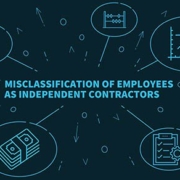Prevent Presenteeism with Clear Policies, Good Benefits
- What is presenteeism and why is it such an important issue?
- Find out how you can address the issue of presenteeism in your workplace.
- Learn how offering mental health and substance use disorder plans can help you mitigate presenteeism.
- Should you encourage employees to use paid sick days as mental health days?
- Find out how unhealthy behaviors can lead to presenteeism.
The problem of presenteeism isn’t new. It has been estimated as costing U.S. employers more than $150 billion annually, according to “the American Productivity Audit,” a 2019 phone survey of 29,000 adult employees by a Pennsylvania health system. And that was before the pandemic.
The COVID-19 crisis has put a new and daunting perspective on presenteeism. But what is presenteeism, you ask? Presenteeism is essentially when an employee shows up for work physically or mentally ill. Obviously, if someone infected with the COVID-19 virus spends time at an office or facility, this jeopardizes staff well-being and productivity. And even those who work from home may be experiencing higher levels of anxiety and depression.
To mitigate the negative impact of presenteeism, employers must continue to address the issue. They can do this through clear wellness policies and, as feasible, effective health care benefits. Here are Fiducial’s best suggestions to help your business deal with presenteeism.
Give permission
A common response to presenteeism is, “But we offer paid sick days.” Although paid sick days do generally help resolve incidences of a physical ailment or injury, they may not adequately help with mental illness or extreme personal stress (such as a divorce or financial crisis). Some supervisors may raise eyebrows at those taking a “mental health day” or even a sick day, so sufferers end up coming in to work when they really need the day off.
Do you sponsor a health care plan? Then, to the extent possible, include coverage for mental health and substance use disorder services. And be sure employees are aware of this. Also, reinforce that you’ll honor the sick-day provisions spelled out in your employee manual for all types of ailments (physical, mental and psychological). Train supervisors to support employees’ well-being and encourage those who need to take time off to do so if they need it.

Discourage unhealthy behaviors
Another common cause of presenteeism is the perceived notion among some workers that they must put in excessive overtime to prove themselves. Many organizations operate under a culture that says putting in extra hours will lead to quicker raises and promotions.
A supervisor might assume that, if an employee is absent, his or her productivity must be suffering. Conversely, if that same employee is putting in extra time and skipping vacations, he or she must be highly productive. But these assumptions aren’t always true — they must be supported by a thorough and objective performance evaluation process.
You can prevent this type of presenteeism by strongly encouraging, if not strictly enforcing, paid time off policies. Communicate to employees your concerns about overworking and remind them to take advantage of the time off that they’ve earned. (Doing so can also deter fraud.)
Stay aware of presenteeism
“Tough it out. Work through it.” These used to be calls to action at many workplaces. Today, they could lead to devastating consequences for an employer. Make sure your organization is aware of presenteeism and is addressing the issue.
Additional Small Business Support
Need help with accounting, payroll, or taxes for your small business? Call Fiducial at 1-866-FIDUCIAL or make an appointment at one of our office locations.
Ready to book an appointment now? Click here. Know someone who might need our services? We love referrals!
For more small business COVID-19 resources, visit Fiducial’s Coronavirus Update Center to find information on SBA loans, tax updates, the Paycheck Protection Program, paid sick and family leave, and more.









